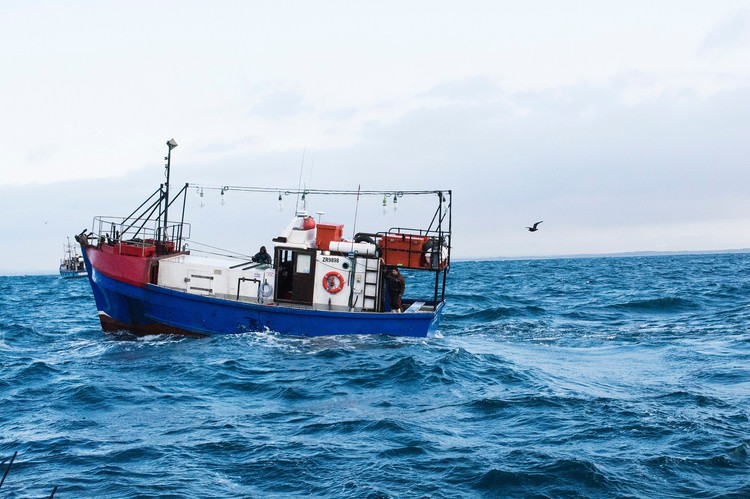
16 May 2024
A fishing boat from an article on chokka (squid) fishers in 2017. Archive photo: Navar Claasen
The South African Squid Management Industrial Association (SASMIA), representing the commercial squid fishing sector, has taken Minister Barbara Creecy of the Department of Forestry, Fisheries and the Environment (DFFE) to court. They contested the squid allocation for small-scale fishers in the Cape High Court on Tuesday and Wednesday.
SASMIA is challenging Creecy’s decision to apportion a 15% fishing right for chokka squid to the small-scale sector and her intention to increase this allocation to 25%.
In June 2021, when the minister announced the squid resource split, she said that it was “a historic step forward for transformation of the small-scale fishing sector”, which included 15 cooperatives and about 600 fishers.
SASMIA initially launched court proceedings against Creecy in June 2022, after it appealed the minister’s decision.
Numerous small-scale fishers from different cooperatives in the Eastern Cape attended the hearings. Cooperatives representing small fishers are also respondents in the case.
In its court papers, SASMIA said the apportionment would threaten the “existence of at least some of the right holders and also inevitably cause a haemorrhaging of jobs throughout the sector”.
SASMIA also argued that there was a lack of consultation with the commercial industry about the split.
It said that the minister was mistaken in assuming that the small-scale sector was able to catch 15%.
“If the small-scale co-ops were to use the permissible small-scale equipment and technology, a 15% apportionment of the [quota] would grossly exceed what could be fished by them,” SASMIA said.
It also argued that the splitting of the squid quota between the small-scale and commercial sector on a long-term basis “exceeded the lawful bounds of the minister’s powers”.
In court on Wednesday, SASMIA legal representative Paul Farlam said that if the minister wanted to enable transformation then she must let new entrants with previously disadvantaged backgrounds into the commercial sector.
Representing the minister, advocate Jolandie Rust laid out a chronology of consultation, arguing that SASMIA had indeed been consulted for several years before the minister made the split decision.
In their papers, the respondents argued that the minister acted within her power and in terms of the Marine Living Resources Act (MLRA). The MLRA, they argued, requires the need for transformation and restructuring of the fishing industry “in order to address historical imbalances and to achieve equality within all the sectors”.
The court papers further said that SASMIA’s opposition to the allocation is “based solely upon a commercial and financial motive”.
They said that setting aside the apportionment would have “serious, harsh, and harmful consequences” for the cooperatives and their members.
Fishers from several small-scale cooperatives sat in on the hearings. Fisher Annie Tities, who is still going out to sea at 76 years old, said that they are fighting for the rights they didn’t have for years. Eastern Cape small-scale fishers received their 15-year small-scale rights in 2020. Before this, they were on interim relief permits.
Tities said they named their cooperative Moeg Gesukkel (tired of struggling) “because it’s been years that we were struggling”.
Fisher Deon Spandiel said that squid is one of the main species from which they make their livelihood. Spandiel said that SASMIA was being “greedy”. “They want the whole pie. They want it all,” he said.
On Wednesday, judgment was reserved by acting judge Mas-udah Pangarker.
Department spokesperson Peter Mbelengwa said the department would comment once judgement has been handed down.
SASMIA did not respond to our request for comment.
Delene Spandiel of the Eastern Cape Khoisan Small-scale Fishing Cooperative attended the court case, along with numerous other fishers from the Eastern Cape. Photo: Liezl Human